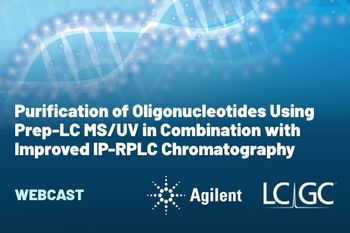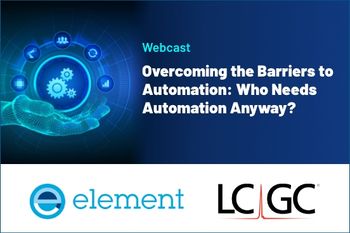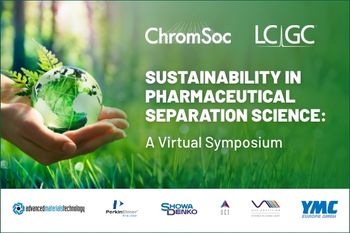
This blog addresses the essential role software has in shaping the present and future of chromatography for the better.

This blog addresses the essential role software has in shaping the present and future of chromatography for the better.

In a lecture at HPLC 2023, Valérie Pichon of ESPCI Paris and Sorbonne University said these advances address limitations of more traditional extraction techniques.

In his plenary lecture at HPLC 2023, Michal Holčapek presented his team's findings on how chromatography can help scientists record the human lipodome and better our understanding of diseases.

At HPLC 2023, Kelly Zhang gave a lecture on how machine learning can help further our understanding of the characterization of lipid nanoparticles.

Webinar Date/Time: Thursday, July 20th, 2023 at 8am PDT | 11am EDT | 4pm BST | 5pm CEST

Webinar Date/Time: Wednesday, June 21st, 2023 at 11am EDT | 8am PDT | 4pm BST | 5pm CEST

Webinar Date/Time: Tue, Jun 13, 2023 11:30 AM EDT

Webinar Date/Time: Thu, Jun 8, 2023 11:00 AM EDT

The workshop will take place 28–29 June 2023 in Liège, Belgium.

Webinar Date/Time: Wed, May 31, 2023 11:00 AM EDT

Webinar Date/Time: Wednesday, May 24th, 2023 at 11am EDT | 8am PDT | 4pm BST | 5pm CEST

Webinar Date/Time: Wed, Jun 28, 2023 1:00 PM EDT

This yearly report on new products introduced at Pittcon and in the preceding year covers sample preparation instruments, supplies, and accessories.

Here's the scoop on the latest offerings in sample preparation.

Webinar Date/Time: Monday, May 22nd, 2023 Morning Session: 9am EDT | 6am PDT | 2pm BST | 3pm CEST Lunchtime Session: 1pm EDT | 10am PDT | 6pm BST | 7pm CEST Afternoon Session: 2pm EDT | 11am PDT | 7pm BST | 8pm CEST Tuesday, May 23rd, 2023 Morning Session: 9am EDT | 6am PDT | 2pm BST | 3pm CEST Lunchtime Session: 1pm EDT | 10am PDT | 6pm BST | 7pm CEST Afternoon Session: 2pm EDT | 11am PDT | 7pm BST | 8pm CEST

Webinar Date/Time: Thu, May 18, 2023 11:00 AM EDT

The 25th edition of the International Symposium on Advances in Extraction Technologies (ExTech) will be held in Tenerife (Canary Islands, Spain) from 18–21 July 2023. Here’s a glimpse of what attendees can look forward to.

Webinar Date/Time: Thursday, April 18, 2023 at 11am EDT | 8am PDT | 4pm BST | 5pm CEST

The 2nd "Advances in Separation Science: From Extraction to Chromatographic Applications" workshop will be held from 28–29 June 2023 in the University of Liège in Belgium.

Webinar Date/Time: Wednesday, April 19, 2023

Webinar Date/Time: Thursday, April 20th, 2023 at 8am PDT | 11am EDT | 4pm BST | 5pm CEST

Webinar Date/Time: Europe: Thursday, March 30th, 2023 at 2pm BST | 3pm CEST | 9am EDT North America: Thursday, March 30th, 2023 at 1pm EDT | 10am PDT | 6pm BST Asia: Friday, March 31st, 2023 at 12pm JST | 11am CST | 11pm EDT

Webinar Date/Time: Tue, Mar 28th 2023 11am EDT | 8am PDT | 5pm CET

On a fundamental level, equilibrium and diffusion define chemical separations. Practical applications of partition coefficients to chromatographic sample preparation illustrate this point.

A recent intercontinental collaboration between two academic research laboratories—the Aristotle University of Thessaloniki, Greece, and the Florida International University, USA—has yielded a significant number of analytical/bioanalytical methods using fabric phase sorptive extraction (FPSE), magnet integrated fabric phase sorptive extraction (MI-FPSE), and capsule phase microextraction (CPME) for the isolation of various analytes from different complex sample matrices.